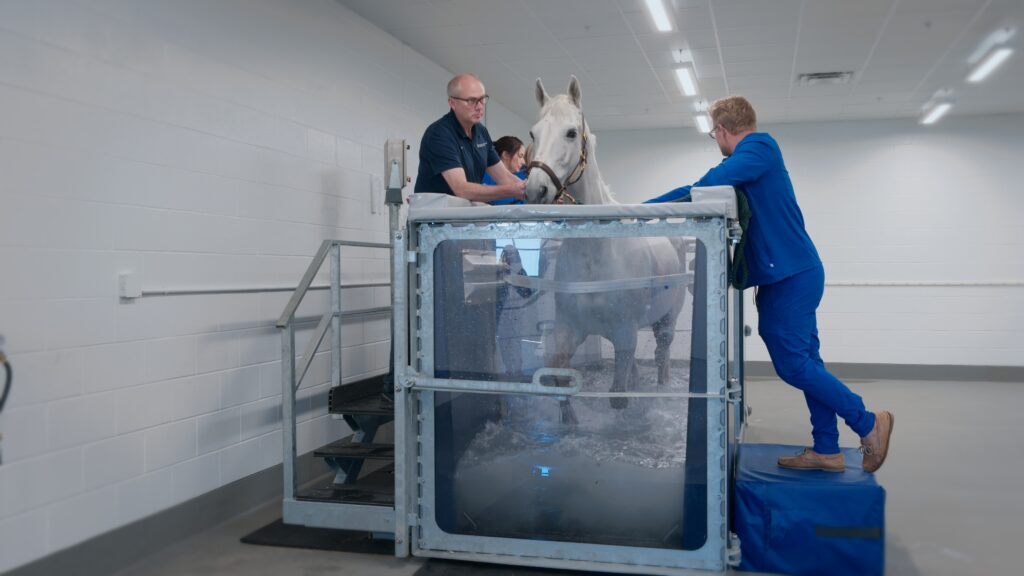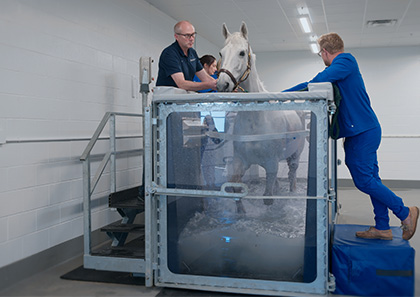
From state-of-the-art diagnostic imaging capabilities to leading-edge rehabilitation therapies, located on site next to Barn W, the University of Florida Veterinary Hospital at World Equestrian Center – Ocala offers a wide array of services to keep your equine athlete performing at its best. As we approach the winter season, we welcome the opportunity to work with you and your horse. This is a great time to focus on ensuring your horse is at their peak for competition. This may mean baseline performance examinations to address any subtle or unresolved lameness, or a strength and conditioning program to optimize fitness and prevent injury.
Prior to, during, and after competition, proper conditioning allows our equine competitors to prepare, accomplish, and recover from the tasks and demands required of elite performance. Similar to human athletes preparing for their competitive season, our equine athletes benefit from similar conditioning modalities and programs. Our team of specialists in Equine Sports Medicine and Rehabilitation are well-versed in the demands of sport horses, and are ready to discuss and prepare a program catered to the needs of your equine athlete.
One of our most popular modalities that is commonly incorporated into many of our conditioning and rehabilitation programs is our Aqua Treadmill Therapy. We have two Aqua Treadmills – both use magnesium sulfate (Epsom) salt water, one is cold water and the other warm water, providing the best options for either strength and conditioning or rehabilitating your horse. In addition to temperature, both speed of exercise and height of water (as shown in video below) can be tailored to provide specific goals of each treadmill session. Notice the differences in range of motion of the hind limbs between the two different heights of water in the horse in the videos below. In addition to influencing range of motion, changing the water height affects other aspects of exercise such as increasing resistance and buoyancy. There are many benefits of exercise in Aqua Treadmills for your horses. It increases joint mobility in limbs and back, improves muscle strength and control, and increases aerobic capacity, all while decreasing impact, making it a great modality to include as part of routine training, as well as for recovery from injury.
If your horse experiences respiratory problems such as equine asthma (“heaves”) or exercise-induced pulmonary hemorrhage (“bleeders”), Dry Salt Therapy, or halotherapy, is a non-invasive therapy which is showing great promise for horses with these types of conditions. Dry Salt Therapy is derived from the age-old practice of dry salt cave therapy. It involves the aerosolization of high quality finely ground salt particles into a specially built low humidity-controlled room. Benefits have also been reported for patients with skin conditions. For treatment, your horse simply stands comfortably in the halogenated room for 20-30 minutes with frequency of treatments determined by the condition and veterinary recommendations.
Coming Soon:
Does your horse have a lameness that is localized to the fetlock and your veterinarian has recommended an MRI? If so, your horse may qualify for enrollment in one of our clinical trials evaluating the use of “PET” or positron emission tomography scanning. If your horse qualifies, they would receive the PET scan at no additional charge. To see if your horse qualifies, please contact us or have your veterinarian contact us at (352) 414-3858.
We are very excited to introduce a new non-invasive dynamic performance evaluation – Acustomyography. Acustomyography examination involves the use of small, wireless piezoelectric crystals that are secured with tape to the muscles or ligaments of interest. These crystals detect changes in pressure waves in the muscles or ligaments that are related to the muscle activity. This information can detect abnormalities and asymmetries that may be related to lameness and pain or weakness that may lead to development of lameness. Examination can be done with the horse in hand or under saddle during routine training to detect subtle abnormalities during performance. Information obtained can be used to direct further diagnostics, develop directed strengthening and physiotherapy programs, and to monitor response and progression over time. Keep an eye on our Website, Instagram, and Facebook for announcement when this amazing diagnostic modality becomes available, we anticipate it any day now! For those interested in more in depth learning about this modality, you may attend an upcoming one-day continuing education short course provided by Advanced Myographic Technologies at the Ocala Breeders’ Sales Company on November 14. https://advancedmyographictechnologies.regfox.com/amt-new-curo-introduction
We are also excited to offer a series of continuing education seminars for both competitors and veterinarians during the Winter Series. We will be offering short presentations on topics including rehabilitation, diagnostic imaging, and biosecurity. Along with opportunities to learn about and discuss these topics, you will be able to tour our facilities, meet our team, and enjoy some snacks! Look out for more details on how to sign up in our November newsletter and our Instagram and Facebook Pages!
Learn more about all of our services at hospitals.vetmed.ufl.edu/wec or contact us at (352) 414-3858 for information and appointments. On Facebook? Follow us at https://www.facebook.com/UFVHWEC.


